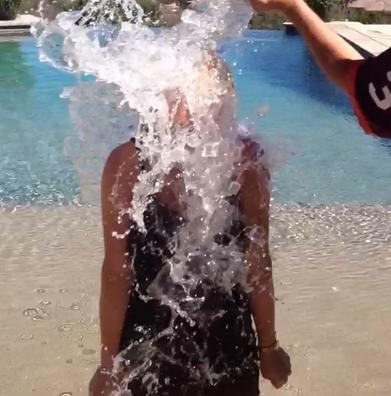CALIFORNIA—The ALS Ice Bucket Challenge has been trending over the past couple of weeks and encouraging people to show their support against Amyotrophic Lateral Sclerosis (ALS). Despite the positive efforts, Californians have to be careful when showing their support to fight the disease because of the drought that is currently affecting the state.
ALS or Lou Gehrig’s disease is an “a progressive neurodegenerative disease that affects nerve cells in the brain and the spinal cord,†according to the ALS Association’s (ALSA) homepage. The disease causes a degeneration of motor neurons that cause the afflicted to lose the ability to move and control their muscles. As the disease progresses, victims become paralyzed and will eventually die from complications.
ALS breaks down the meaning of ALS as “A-myo-trophic comes from the Greek language. â€A” means no or negative. “Myo” refers to muscle, and “Trophic” means nourishment–”No muscle nourishment.” When a muscle has no nourishment, it “atrophies” or wastes away. “Lateral” identifies the areas in a person’s spinal cord where portions of the nerve cells that signal and control the muscles are located. As this area degenerates it leads to scarring or hardening (“sclerosis”) in the region. Though the true cause of ALS is unknown, 5-10 percent of the time, ALS is the result of genetic mutation, but the typically another there is more than one member of the family that also has ALS, though the genes being passed down as a sort of genetic inheritance is not always the case, even when the disease is present in multiple family members.
Symptoms of ALS include muscle weakness, difficulty swallowing or breathing, and impairment of arm and legs, twitching and muscle cramping; particularly in hands or feet. Thick speech and a difficulty projecting the voice are also symptoms; more advanced stages included shortness of breath, and difficulty with breathing and swallowing.
In 2011, ALSA stated through two independent studies they funded, the ALSA “found a genetic abnormality that according to researchers is the most common cause of Amyotrophic lateral sclerosis (ALS) and frontotemporal dementia (FTD). As reported in the recent online issue of the scientific journal Neuron, an unusual mutation was discovered, where a short DNA sequence is repeated many more times as compared to healthy individuals.â€
The gene known as C9ORF72 accounts for 25 to 40 percent of all familial ALS (FALS) cases, “depending on the population), and also approximately 4 percent to 6 percent of sporadic cases. As noted, these apparently sporadic cases are in fact genetic. The gene mutation appears to act in a dominant manner.†ALS typically affects people in the age range between 40 and 70. “The ALS Association has committed $99 million to find effective treatments and a cure to Lou Gehrig’s disease.€
The typical length of survival with the disease is 3-5 years, but many people have been known to live 10 years or more. Because ALS affects muscle neurons, as the disease progresses, those afflicted will eventually have to rely on a permanent ventilator for support to live.
The Ice Bucket Challenge comes in to play by spreading awareness of the disease. By
recording a video of yourself being drenched by a bucket of iced
water; and then posting the chilling video to a social media page,
and nominating others to join in, the name of the disease is spread
and brings about awareness.
False claims have been spreading suggesting that Californians who perform the ALS Ice Bucket challenge could be slapped with a $500 fine, but Kimberly Hughes of the Los Angeles Department Water and Power dispelled the rumor to Canyon News. In response to the ALS challenge, the Los Angeles Department of Water and Power has indicated that they “don’t have rules in place to restrict the use of the water for the challenge, but what people are doing is off-setting the water use, by skipping a shower. People can then take the challenge, skip a shower and donate to fight ALS.”
The ALS Association does remind participants to keep in mind that water is still a valuable resource; should the water be from an area that is experiencing a drought, the water should be re-purposed. Many celebrities have found ways to participate in the challenge while keeping conscious of water usage; actress Nina Dobrev posted a video of herself on a boat conducting the Ice Bucket Challenge before jumping into the ocean and singer Britney Spears stood in a pool, as a bucket of ice water was dumped on her.
As of August 20, the Ice Bucket Challenge has already raised $31.5 million for ALS research. Other ways to support ALS include joining the “Walk to Defeat ALS†as well as involvement in fundraisers, sharing information about the disease or donating to the ALSA at: www.alsa.org/donate.






